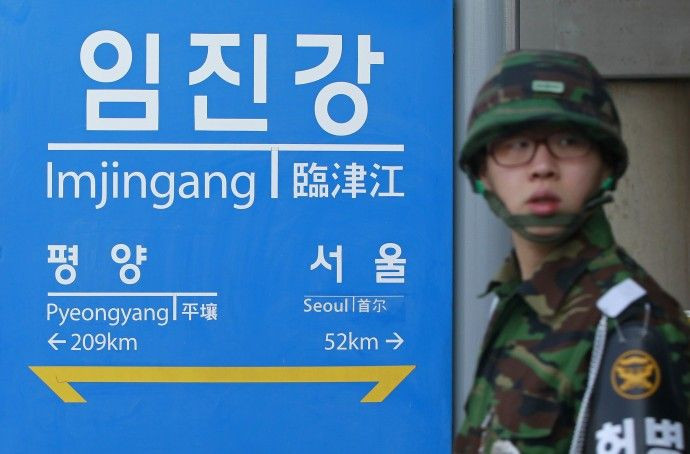South Korea's Lee Myung-bak warns North of strong 'counter-attacks'

South Korean President Lee Myung-bak, called on the country's military to strike merciless 'counter-attacks on the North. Lee visited the front-line army units in Yanggu of Gangwon Province on Thursday. Despite domestic opposition, Seoul's hard-line Government is holding the one of its largest-ever military at Pocheon, 20km south of the North Korean border. The country so far conducted 47 drills in the past year.
Attack helicopters, F-15 jets, K-9 self-propelled guns, multiple launch rocket systems, anti-aircraft guns and 800 soldiers are conducting drills to demonstrate South's 'solid military preparedness'. Meanwhile, the North dismissed the exercises as acts of the puppet warmongers but has not threatened any retaliatory strikes.
I thought patience would bring peace to this land, but (the reality) was not so, Lee told the local news agencies.
He urged the people to develop a strong sense of national unity and effectively respond to the threats of the communist North. The South Korean military have recently held live-firing exercises on Yeonpyeong Island, amid heightened tensions in the region and constant threats of retaliation from officials in Pyongyang. North Korea's artillery shelling on Yeonpyeong last month killed two South Korean soldiers and two civilians.
Observers worldwide have urged restraint while domestic opposition demanded immediate halt to the exercises. Analysts also warned that the South's war maneuvers could push the Korean Peninsula to the brink of a nuclear war. Russia and China have already urged Seoul to refrain from conducting military exercises, stating that the drills could worsen the state of affairs in the Korean peninsula.
The communist North is currently boasting of at least 12 nuclear weapons in its arsenal, all based on plutonium. With the display of thousands of centrifuges in the recent months, experts have also suggested that it is highly likely for Pyongyang to succeed in developing Hydrogen bombs rapidly. Observers are warning that any use of the weapons could have catastrophic effects in the region.
The country is also believed to have one of the largest armies in the world. It has an estimated active duty military force of up to 1.2 million personnel, compared to about 680,000 in the South. Spending more than 25 per cent of its GNP on defense, the state has reportedly acquired hundreds of road-mobile ballistic missiles with a projected range of 3,000 to 4,000 kilometers and the latest versions of the No-dong ballistic missile. It is also reported that the North Korean army has more than 10,000 artillery pieces along with 700 naval units and close to 70 submarines.
© Copyright IBTimes 2025. All rights reserved.





















